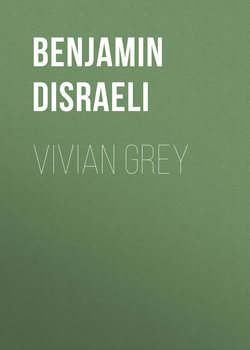Читать книгу Vivian Grey - Benjamin Disraeli - Страница 29
BOOK III
CHAPTER III
Оглавление“Is Mr. Cleveland handsome?” asked Mrs. Felix Lorraine of Vivian, immediately on his return, “and what colour are his eyes?”
“Upon my honour, I have not the least recollection of ever looking at them; but I believe he is not blind.”
“How foolish you are! now tell me, pray, point de moquerie, is he amusing?”
“What does Mrs. Felix Lorraine mean by amusing?” asked Vivian.
“Oh! you always tease me with your definitions; go away. I will quarrel with you.”
“By-the-bye, Mrs. Felix Lorraine, how is Colonel Delmington?”
Vivian redeemed his pledge: Mr. Cleveland arrived. It was the wish of the Marquess, if possible, not to meet his old friend till dinner-time. He thought that, surrounded by his guests, certain awkward senatorial reminiscences might be got over. But, unfortunately, Mr. Cleveland arrived about an hour before dinner, and, as it was a cold autumnal day, most of the visitors who were staying at Château Desir were assembled in the drawing-room. The Marquess sallied forward to receive his guest with a most dignified countenance and a most aristocratic step; but, before he got half-way, his coronation pace degenerated into a strut, and then into a shamble, and with an awkward and confused countenance, half impudent and half flinching, he held forward his left hand to his newly-arrived visitor. Mr. Cleveland looked terrifically courteous and amiably arrogant. He greeted the Marquess with a smile at once gracious and grim, and looked something like Goliath, as you see the Philistine depicted in some old German painting, looking down upon the pigmy fighting men of Israel.
As is generally the custom when there is a great deal to be arranged and many points to be settled, days flew over, and very little of the future system of the party was matured. Vivian made one or two ineffectual struggles to bring the Marquess to a business-like habit of mind, but his Lordship never dared to trust himself alone with Cleveland, and, indeed, almost lost the power of speech when in presence of the future leader of his party; so, in the morning, the Marquess played off the two Lords and Sir Berdmore against his former friend, and then, to compensate for not meeting Mr. Cleveland in the morning, he was particularly courteous to him at dinner-time, and asked him always “how he liked his ride?” and invariably took wine with him. As for the rest of the day, he had particularly requested his faithful counsellor, Mrs. Felix Lorraine, “for God’s sake to take this man off his shoulders;” and so that lady, with her usual kindness, and merely to oblige his Lordship, was good enough to patronise Mr. Cleveland, and on the fourth day was taking a moonlit walk with him.
Mr. Cleveland had now been ten days at Château Desir, and was to take his departure the next morning for Wales, in order to arrange everything for his immediate settlement in the metropolis. Every point of importance was postponed until their meeting in London. Mr. Cleveland only agreed to take the lead of the party in the Commons, and received the personal pledge of Lord Courtown as to the promised office.
It was a September day, and to escape from the excessive heat of the sun, and at the same time to enjoy the freshness of the air, Vivian was writing his letters in the conservatory, which opened into one of the drawing-rooms. The numerous party which then honoured the Château with their presence were out, as he conceived, on a picnic excursion to the Elfin’s Well, a beautiful spot about ten miles off; and among the adventurers were, as he imagined, Mrs. Felix Lorraine and Mr. Cleveland.
Vivian was rather surprised at hearing voices in the adjoining room, and he was still more so when, on looking round, he found that the sounds proceeded from the very two individuals whom he thought were far away. Some tall American plants concealed him from their view, but he observed all that passed distinctly, and a singular scene it was. Mrs. Felix Lorraine was on her knees at the feet of Mr. Cleveland; her countenance indicated the most contrary passions, contending, as it were, for mastery; supplication, anger, and, shall I call it, love? Her companion’s countenance was hid, but it was evident that it was not wreathed with smiles: there were a few hurried sentences uttered, and then both quitted the room at different doors, the lady in despair, and the gentleman in disgust.
